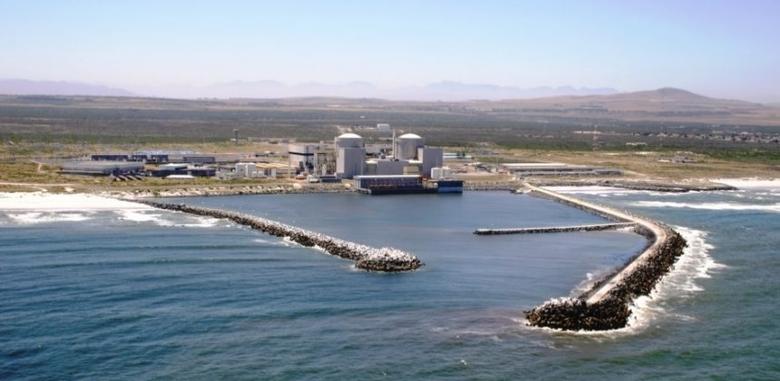
SOUTH AFRICA'S NUCLEAR POWER

WNN - South Africa must consider nuclear as a clean energy source that can be part of its electricity generation mix, Energy Minister Jeff Radebe said yesterday in his keynote speech at a business awards ceremony.
"As a developing economy, plagued by high poverty and unemployment levels, the issue of reliable and affordable energy is critical," Radebe said. "The impact of unreliable or unaffordable energy on value-creating industries which contribute significantly to economic development could be very devastating if unmanaged."
Sustainable energy planning requires a "holistic approach" to planning for future energy needs, ensuring environmental and climate change issues, together with social development and economic growth, are all considered in a balanced manner, he said.
"We have come to realise that achieving these objectives simultaneously is no easy task as it entails juggling competing and often conflicting objectives. During the energy planning process, we therefore cannot discriminate against or favour any particular energy carriers," he said.
The country cannot not ignore its abundant coal reserves, and the "relatively low" price of coal, but this is "counter-balanced" by coal's high carbon content and internalised through policy options including emissions reduction targets and the introduction of carbon taxes.
"We have to consider nuclear, and despite its high capital costs, we have not lost sight of the fact that this is a clean energy source that can contribute optimally for electricity generation," the minister said.
South Africa's long-term energy plans are outlined under the Integrated Resource Plan (IRP), which first came into effect in 2011. At that time, the plan called for construction of 9600 MWe of new nuclear capacity over the period to 2030. However, a draft update to the IRP, released by Radebe for public comment in 2018, proposes nuclear capacity remaining at 1860 MWe - the capacity of the country's currently operating Koeberg nuclear power plant.
The Portfolio Committee on Energy, which provides parliamentary oversight for the work of South Africa's energy department, in November said the IRP should make it explicit that both coal and nuclear will remain important elements of the country's energy mix.
-----
Earlier:

2019, January, 14, 11:05:00
U.S. NUCLEAR FOR AFRICAISSUES - Yet the United States still has an opportunity to help interested African nations overcome the obstacles to realizing their energy ambitions. Whereas Russia and China have large government investments in a few advanced nuclear technologies, the United States has a robust and thriving private sector for advanced nuclear development, drawing on both decades of public research and development and a high-tech investment ecosystem. From large national laboratories to small venture-backed start-ups, the United States has over 50 firms working on a diverse portfolio of advanced nuclear designs, many targeting smaller or niche markets. |

2019, January, 11, 11:40:00
FAST ENERGY GROWTHU.S. EIA - Energy consumption in Asia, the Middle East, and Africa continues to grow rapidly, with about 20% growth in each region between 2010 and 2016, according to newly available data in EIA’s International Energy Statistics database. In particular, energy consumption has been increasing in the Middle East and Africa, driven by economic growth, increased access to energy markets, and quickly growing populations. Energy consumption in Asia grew even as energy consumption in China declined between 2015 and 2016. |

2018, December, 3, 11:35:00
SOUTH AFRICA'S NUCLEARWNN - Energy infrastructure is a critical component of South Africa's National Development Plan (NDP), which was published in 2011 and identifies the need for investment in a strong network of economic infrastructure designed to support the country’s medium- and long-term economic and social objectives. The IRP plays a crucial role in contributing to the objectives of the NDP, the Committee said in its report. |

2018, November, 22, 10:35:00
SOUTH AFRICA'S LAGGINGIMF - Some of the negative effects of the changing external environment are already being felt in South Africa despite its economic resilience. |

2018, September, 13, 14:00:00
NUCLEAR POWER NEEDS INVESTMENTIAEA - Overall, the new projections suggest that nuclear power may struggle to maintain its current place in the world’s energy mix. In the low case to 2030, the projections show nuclear electricity generating capacity falling by more than 10% from a net installed capacity of 392 gigawatts (electrical) (GW(e)) at the end of 2017. In the high case, generating capacity increases 30% to 511 GW(e), a drop of 45 GW(e) from last year’s projection. Longer term, generating capacity declines to 2040 in the low case before rebounding to 2030 levels by mid-century, when nuclear is seen providing 2.8% of global generating capacity compared with 5.7% today. |

2018, August, 29, 10:10:00
SOUTH AFRICA NUCLEAR STATICWNN - A draft updated Integrated Resource Plan (IRP) approved by South Africa's cabinet on 22 August sees the country's nuclear capacity remaining at its current 1830 MWe over the period to 2030. Energy Minister Jeff Radebe yesterday released the plan for public comment. |

2018, August, 3, 09:15:00
SOUTH AFRICA: NEGATIVE GROWTHIMF - Amid a marked growth deceleration, some of South Africa’s economic and social achievements after the end of apartheid have recently unwound. While the economy is globally positioned, sophisticated, and diversified, gaps in physical infrastructure and education create large productivity differentials across sectors. Low consumer and business confidence has dampened productivity growth. Fast growing debt has constrained policy space. As a result, per-capita growth has turned negative, the poverty rate stands at around 40 percent, unemployment has crept up to 27 percent—almost twice that level for the youth—and income inequality is one of the highest globally. |








